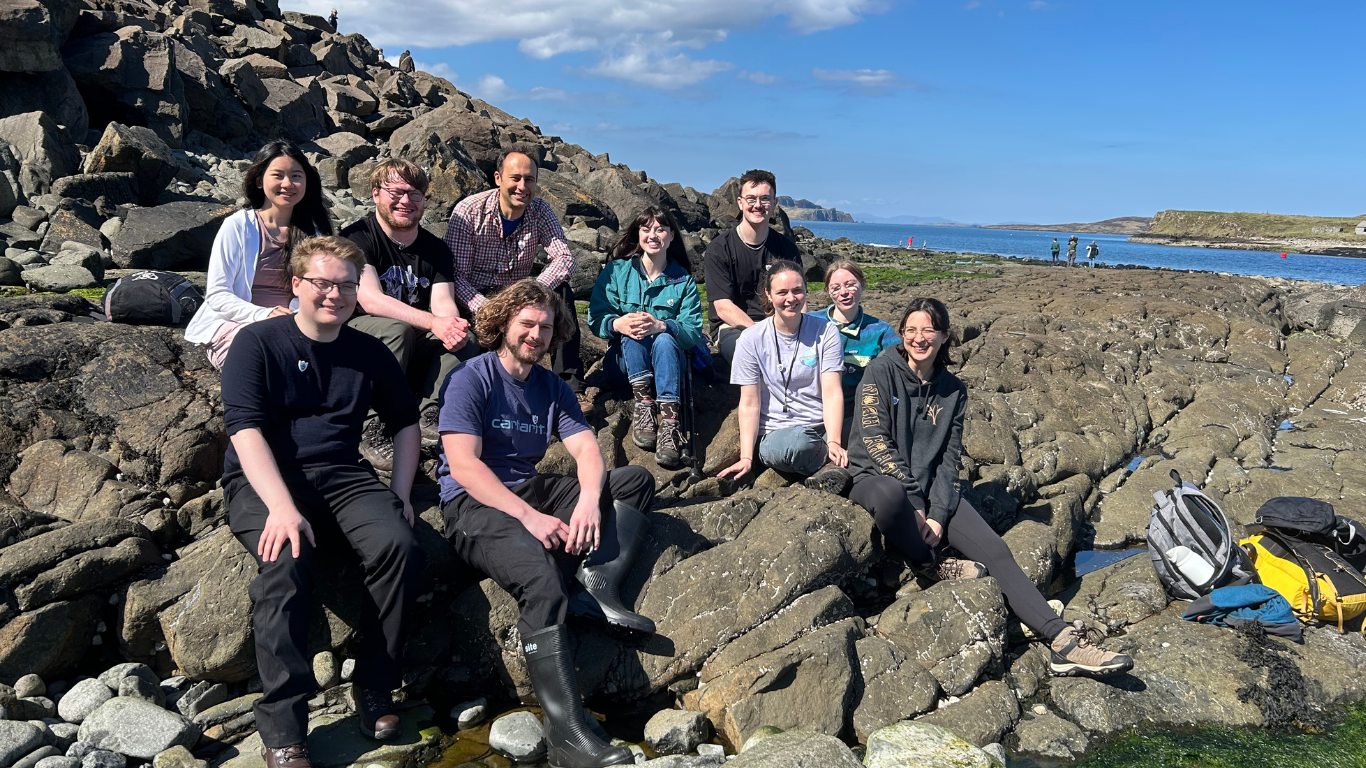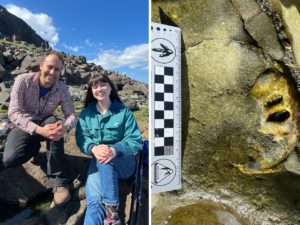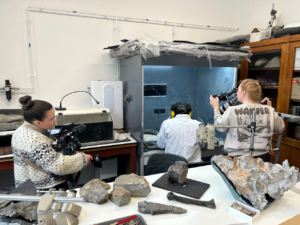Walking With Dinosaurs x GeoSciences Field Trip

Cover photo image: Upper row – Aurora Liu (MScR), Adam Manning (PhD), Professor Steve Brusatte, Abby Cook (Blue Peter presenter), David Kirson (MScr) Bottom row – Jack Davidson (MScR), Ross Simpson (MScR), Milly Mead (PhD), Issy Walker (MScR), Carly Pligersdorffer (MScR)
What connects ancient dinosaur tracks on a Scottish island with a rebooted BBC classic and one of the UK’s most iconic children’s TV shows? A field trip led by the School of GeoSciences, Professor Steve Brusatte.
Earlier this year, students from the School of GeoSciences travelled to the Isle of Skye for a field trip to study fossilised dinosaur footprints; a rare opportunity to walk quite literally in the footsteps of prehistoric giants. The trip coincided with filming for the BBC’s Walking With Dinosaurs, a new take on the original documentary series that first aired in 1999.
Professor Brusatte, lecturer and researcher within the School of GeoSciences, author and science communicator, worked as a consultant on the new series.
Joined by a camera crew and presenters to film a special feature for Blue Peter on the Isle of Skye’s coastline, Steve and his students showcased what these fossilised prints can tell us about Scotland’s Jurassic past.
We caught up with Steve and Ross, a MScR Palaeontology & Geobiology student who were interviewed by Blue Peter, about their experience during the field trip.
So Steve, tell us, how did this field trip come about, and how were students on your course able to take part in this opportunity?
Since I began my faculty position in Edinburgh I’ve been doing regular trips to Skye, which is the best place in Scotland to find fossils of dinosaurs and other Jurassic-aged animals from around 170 million years ago.
Many of our Palaeontology & Geobiology MScR students over the years have done dissertations on Skye material, and we do regular student fieldtrips to introduce new cohorts of students to Scotland’s real Jurassic Park!
And over the years, on these fieldtrips, students have found some of the most incredible fossils. New dinosaur footprint sites where big meat-eaters and long-necked plant-eaters once splashed through subtropical lagoons, new dinosaur bones, even skeletons of new species of pterodactyls and ocean-living reptiles
Without these discoveries by students, we would know so much less about the prehistory of Scotland. Our students are doing actual, real, innovative fieldwork and making critical new discoveries. It is so much more than just learning science. They are doing science, contributing to science.
Can you summarise what took place during the field trip?
Students spent a week prospecting for fossils along the coast of Skye, surveyed dinosaur tracksites that we had previously discovered, searched for new dinosaur tracks, and found and collected new fossils of reptiles that lived in the Jurassic oceans.

How did the filming opportunity with Blue Peter happen?
They got in touch with me about doing a dinosaur episode to sync with the release of Walking With Dinosaurs, I told them we were about to go to Skye with the students, and they wanted to come along.
Can you tell us more about your role as a consultant on the new Walking With Dinosaurs series?
I’ve worked with the BBC on their Walking With Dinosaurs franchise since 2012, when I consulted on a big-screen movie adaptation of the famous series. Over the years I’ve been their ‘resident palaeontologist’, which really was being a sounding board as they explored new ideas for television series, and toys, video games, books, and other dinosaur products.
A few years ago, when they decided to revamp the television series for a special 25th anniversary reboot of the franchise, they asked me to be one of the lead consultants.
I had many meetings with the producers, researchers, and writers, and it was my job to ensure they were fluent in the latest research on dinosaurs. I helped them research and develop storylines for the series, and then went through scripts and early cuts of the episodes to check the accuracy of the science, and checked many versions of their computer-generated dinosaur designs to ensure accuracy.
Ross, what was it like being part of a Blue Peter episode while on a field trip?
Unreal. Blue Peter has had a long history, and getting the chance to be a part of that history still hasn’t fully sunk in yet. The team at Blue Peter do some incredible work and are great at communicating many topics to younger audiences. Having the chance to contribute to that is a great feeling.
Steve, what do you think students gain from field trips like this, beyond the academic experience?
We love bringing our Masters students into the field. There is a lot to learn in the classroom, but when it comes down to it, nothing is more magical than going out, collecting your own fossils, being the first person to see these treasures from millions of years ago and imagining the world they lived in. And, when our students do fieldwork, they get to work together, share the wonder of being in a beautiful place looking for fossils, and form a stronger bond. Not only that, but they do fieldwork with us, so it is time spent learning practical skills one-on-one with faculty. And wow, the new discoveries they make are just astounding.

Ross, as a student, what’s your perspective on the importance of fieldwork? Do you think it’s a vital element?
Fieldwork is how we get the answers to our questions. Whether that’s fossils or geochemical signatures or mineral formation, or the interactions and information we can get from all the subfields in geosciences. We wouldn’t be able to do much if we didn’t get the chance to go into the field. Also it’s just fun.
Steve, have any of your former students gone on to work in science communication, museums, or media?
Yes!
In fact, one of my recently graduated PhD students, Natalia Jagielska, also consulted on the new Walking With Dinosaurs for the BBC.
She did her doctorate on pterodactyls, the flying reptiles that soared overhead of dinosaurs. She described an amazing fossil we collected on Skye a few years ago, on another student trip, found by Amelia Penny, then a PhD student and now a lecturer in the School of GeoSciences. A nearly complete skeleton of a new species of pterodactyl, which we named Dearc.
In doing this PhD, Natalia become one of the world’s experts on pterodactyls, so the BBC came to her to fact check the pterodactyl designs in Walking With Dinosaurs! I was very proud to see both of our names in the on-screen credits, next to each other.
Ross, why did you decide to study MScR Palaeontology & Geobiology?
Palaeontology has always been my passion, ever since I was a kid.
In 2023 I had just finished studying Biology in Aberdeen and took a year out to recover from academic burnout and earn some money. I saw that the University of Edinburgh had this course and knew I had to take the chance. Glad I did!
Finally, what has been the highlight of your degree so far? And do you have advice to prospective students seeking to study MScR Palaeontology & Geobiology?
I think it has to be the field trip to Skye. I’ve always wanted to go to the isles myself. The drive to and from Skye was full of stunning views, as was Skye itself. The chance to get some proper field work experience was also a great benefit, and we had some really great finds. I will genuinely hold the time and memories I had in Skye dearly.
A big thing I would say to prospective applicants is don’t get disheartened. Palaeontology is a fairly niche field with few opportunities for it, especially in Scotland. Focus on one field you like, such as Biology or Geology, and keep working towards your goal. You may experience setbacks like I did, but don’t let them stop you. You can do it!
Quicklinks
You can watch the rebooted Walking With Dinosaurs series and the Blue Peter Walking With Dinosaurs Takeover on BBC iplayer (UK residents only).
Want to learn more about our MScR Palaentology & Geobiology? Check out to our course overview.
Interested in finding out more about our Field Work? Watch our videos.



